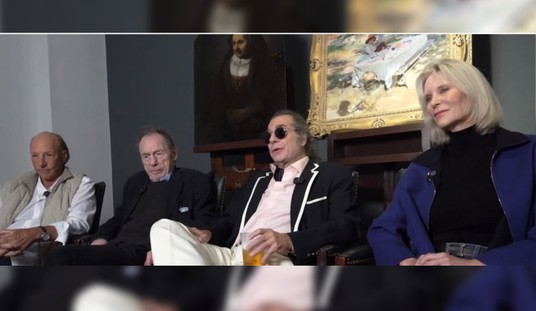When I was a high-school kid, back in Honolulu in the early sixties, the book we were all reading was Robert A. Heinlein’s Stranger in a Strange Land, which had come out just a couple of years earlier and already had given modern English a new word, “to grok.” All of us rebellious adolescents loved that book and put it on our shelves right alongside Joseph Heller’s Catch -22. Later I devoured much of the rest of the Heinlein ouevre, including of course Starship Troopers and The Moon Is a Harsh Mistress. It never occurred to me in those days to read science-fiction politically, but if Stranger was anything at the time, it was a proto-hippie novel — a celebration of free love and counter-cultural rebellion on the part of a main character who was, literally, raised on Mars. (I believe the novel was also a strong influence on The Who’s celebrated rock opera, Tommy, which followed it by a few years.)
Now comes the new New Republic, further left than in its previous incarnation, with an attack on Heinlein via a review of a new biography of the author by William Patterson:
The science-fiction writer Robert A. Heinlein once described himself as “a preacher with no church.” More accurately, he was a preacher with too many churches. Rare among the many intellectual gurus whose fame mushroomed in the 1960s, Heinlein was a beacon for hippies and hawks, libertarians and authoritarians, and many other contending faiths—but rarely at the same time. While America became increasingly liberal, he became increasingly right wing, and it hobbled his once-formidable imagination. His career, as a new biography inadvertently proves, is a case study in the literary perils of political extremism.
Heinlein’s most famous novel, Stranger in a Strange Land (1961), was a counter-culture Bible, its message of free love inspiring not just secular polygamous communes but also the Church of All Worlds, a still-flourishing New Age sect incorporated in 1968. Heinlein was equally beloved in military circles, especially for his book Starship Troopers (1959), a gung-ho shout-out for organized belligerence as the key to human survival. A thoroughly authoritarian book, it included an ode to flogging (a practice the American Navy banned in 1861) and the execution of mentally disturbed criminals, yet Heinlein became a hero to libertarians: Milton Friedman praised Heinlein’s 1966 novel The Moon Is A Harsh Mistress, which chronicled an anti-statist rebellion on a lunar colony, as a “wonderful” book and commended Heinlein for popularizing the slogan TANSTAAFL (“There ain’t no such thing as a free lunch”).
Heinlein, who died in 1988 at age 80, lived a large, complex, and contradictory life. His friend and fellow science-fiction writer Arthur C. Clark once noted that Heinlein was “very protean. Heinlein was everything—like Walt Whitman.” The publication of the second volume of a mammoth Heinlein biography by the late William Patterson is, alas, only partially helpful in getting a grip on this complicated writer. Authorized by the Heinlein estate and fannishly worshipful, Patterson lacked sufficient distance from his subject to tackle the central puzzles of Heinlein’s life.
And what are those central puzzles? According to reviewer Jeet Heer, they are mostly his political evolution rightward. It’s a ridiculous assertion on its face, since the celebration of military life, Starship Troopers, comes before Stranger, not after. Here’s his argument:
Take, for example, the crucial issue of Heinlein’s political evolution. Heinlein went from being a left-wing New Dealer in the 1930s and 1940s to flirting with the John Birch Society in the late 1950s and supporting Barry Goldwater in the 1960s—and yet, he insisted that his politics were unwaveringly consistent. “From my point of view what has happed is not that I have moved to the right; it seems to me that both parties have moved steadily to the left,” Heinlein wrote his brother in 1964. Patterson, as was his wont on all major issues, sides with his subject and maintains that Heinlein’s politics remained fundamentally unchanged through his life. Heinlein was no “rightist,” Patterson assures us, but a lifelong “radical liberal” with a “democratic soul.” Patterson never explains how that “democratic soul” came to believe that the right to vote should be severely restricted, a position Heinlein advocated not just in Starship Troopers but also in nonfiction works.
First off, a lot of people moved from the New Deal to more conservative positions as they got older and smarter — Ronald Reagan, for example. Second, Heinlein was absolutely right — both parties had moved to the left by 1964 — the Democrats were led by Lyndon Johnson, while the Nixon-Rockefeller Republicans were caught napping that year by Barry Goldwater, who was attempting to pull the GOP back to the right. Finally, there’s nothing at all contradictory between being a “radical liberal” (in the true sense of the word, not its contemporary meaning as a “progressive”) and having a “democratic soul.” In fact, they’re entirely complementary. Democracy is not simply about universal suffrage (in fact, it’s not about that at all), although the Left would certainly like you to think that; Leftists need to go back to Greek democracy to see what Heinlein means.
The rest of the hatchet job essentially roasts Heinlein for the only cardinal sin in the Leftist canon: hypocrisy. How could he be an apostle of free love and a conservative at the same time? (Wrong question: how could he be a famous creative artist and not be motivated by sex?)
Taken together, Heinlein’s books in his right-wing phase hardly add up to a logical worldview. How do we reconcile the savage authoritarianism of Starship Troopers with the peace-and-love mysticism of Stranger in a Strange Land? For that matter, how do those two books jibe to the nearly anarchist libertarianism of the Moon Is a Harsh Mistress? On a more practical plain, how could Heinlein have called for both limited government and a NASA committed to colonizing space (surely a big government program if there ever was one)? TANSTAAFL went out the window when a space or military program caught Heinlein’s fancy.
But all these books share one trait: They ignore the consequences of people’s actions. Starship Troopers gives us war without PTSD and guilt over slaughter (the aliens are Bugs, so can be exterminated without remorse) just as Stranger in a Strange Land is a vision of sex without strings (“grokking” means never having to say sorry). In other books, Heinlein gave us incest without trauma.
Such are the perils of trying to attack an author via a biography, but not understanding your own prejudices and expressing your tired world-view in cant and jargon. If you can’t fight a war without whining about PTSD and you can’t exterminate the Bugs of Starship Troopers without the slightest bit of remorse, then there is no hope for either democracy or humanity. Heinlein’s view was try everything, live hard, die harder — something as alien as the Bugs to today’s pansy Left, for whom there is nothing worth dying for and therefore nothing worth living for. They just can’t grok it. No wonder they hate him.
*****
Join the discussion on Twitter. The essay above is the sixth in volume 2 of the cultural discussions between the writers of PJ Lifestyle and Liberty Island exploring the history of counter-cultures, the future of conservatism and the role of new, emerging counter-cultures in restoring American exceptionalism.
Volume II
- Frank J. Fleming on February 26, 2015: What Is the Future of Government? Why It Won’t Look Like Star Trek
- Aaron C. Smith on February 26, 2015: What Is the Future of Superheroes? Why They Need To Start Killing Super-Villains
- Mark Ellis on February 26, 2016: What Is the Future of Gen-X Manhood? Adam Carolla Vs Chuck Palahniuk?
- David S. Bernstein on February 26, 2015: What is the Future of Fiction? You’ll Be Shocked Who’s Fighting the New Conservative Counter-Culture
- Aaron C. Smith on March 2, 2015: The House Loses: Why Season 3 of House of Cards Utterly Disappoints
See the first volume of articles from 2014 and January and February 2015 below:
2014 – Starting the Discussion
- Sarah Hoyt, March 22 2014: Interview: Adam Bellow Unveils New Media Publishing Platform Liberty Island
- David S. Bernstein, June 20 2014: What Is Liberty Island?
- Adam Bellow at National Review, June 30 2014 kicking off the discussion: Let Your Right Brain Run Free
- Dave Swindle on September 7, 2014: Why Culture Warriors Should Understand the 10 Astounding Eras of Disney Animation’s Evolution
- Dave Swindle on September 9, 2014: The 50 Greatest Counter-Culture Films of All Time, Part I
- Dave Swindle on September 19, 2014: The 50 Greatest Counter-Culture Films of All Time, Part II
- David S. Bernstein on November 19, 2014: 5 Leaders of the New Conservative Counter-Culture
- Dave Swindle on November 25, 2014: 7 Reasons Why Thanksgiving Will Be My Last Day on Facebook
- Kathy Shaidle on November 25, 2014: Is America Overdue for a Satanic Revival? (Part One)
- Dave Swindle on December 2, 2014: My Growing List of 65 Read-ALL-Their-Books Authors
- Kathy Shaidle on December 3, 2014: Is America Overdue for a Satanic Revival? (Part Two)
- Mark Elllis on December 9, 2014: Ozzy Osbourne and the Conservative Tent: Is He In?
- Aaron C. Smith on December 22, 2014: The Villains You Choose
January 2015 – Volume I
- Paula Bolyard on January 1, 2015: 7 New Year’s Resolutions for Conservatives
- Susan L.M. Goldberg on January 1, 2015: The Plan to Take Back Feminism in 2015
- Kathy Shaidle on January 4, 2015: Did the 1960s Really Happen? (Part One)
- Andrew Klavan on January 5, 2015: In 2015 The New Counter-Culture Needs to Be Offensive!
- Clay Waters on January 5, 2015: The Decline and Fall of Russell Brand
- Mark Ellis on January 5, 2015: How Conservatives Can Counter the Likable Liberal
- Audie Cockings on January 5, 2015: Entertainers Have Shorter Lifespans
- Aaron C. Smith on January 6, 2015: How Mario Cuomo Honestly Defined Zero-Sum Liberalism
- Stephen McDonald on January 10, 2015: Why the New Counter-Culture Should Make Strength Central to Its Identity
- Stephen McDonald on January 16, 2015: The Metaphorical War
- Kathy Shaidle on January 19, 2015: Did the 1960s Really Happen? (Part Two)
- Frank J. Fleming on January 20, 2015: What if Red Dawn Happened, But It Was Islamic Terrorists Instead of Communists?
- Mark Ellis on January 21, 2015: Adam Carolla: The Quintessential Counterculture Conservative?
- Aaron C. Smith on January 29, 2015: Objection! Why TV’s The Good Wife Isn’t Good Law
February 2015
- David Solway on February 2, 2015: For a Song To Be Good, Must It Tell The Truth?
- Mark Ellis on February 6, 2015: President Me: Adam Carolla Vs. the Scourge of Narcissism
- David Solway on February 6, 2015: ‘Imagine’ a World Without the Brotherhood
- Kathy Shaidle on February 9, 2015: Was Rod McKuen the Secret Godfather of Punk Rock?
- Aaron C. Smith on February 10, 2015: Kick NBC While It’s Down: Use The Williams Scandal to Set the Terms of the 2016 Debates
- Spencer Klavan on February 12, 2015: How to Apologize for Your Thought Crimes
- Kathy Shaidle on February 16, 2015: David Byrne: Creepy Liberal Hypocrite
- David P. Goldman on February 18, 2015: Understanding This Bloody Truth About the Bible Will Save Your Life
- Lisa De Pasquale on February 20, 2015: Why American Sniper Is a Much Better Love Story Than Fifty Shades of Grey
- Spencer Klavan on February 24, 2015: How Bad Ideology Destroys Good TV: Why Glee Crashed and Burned









Join the conversation as a VIP Member